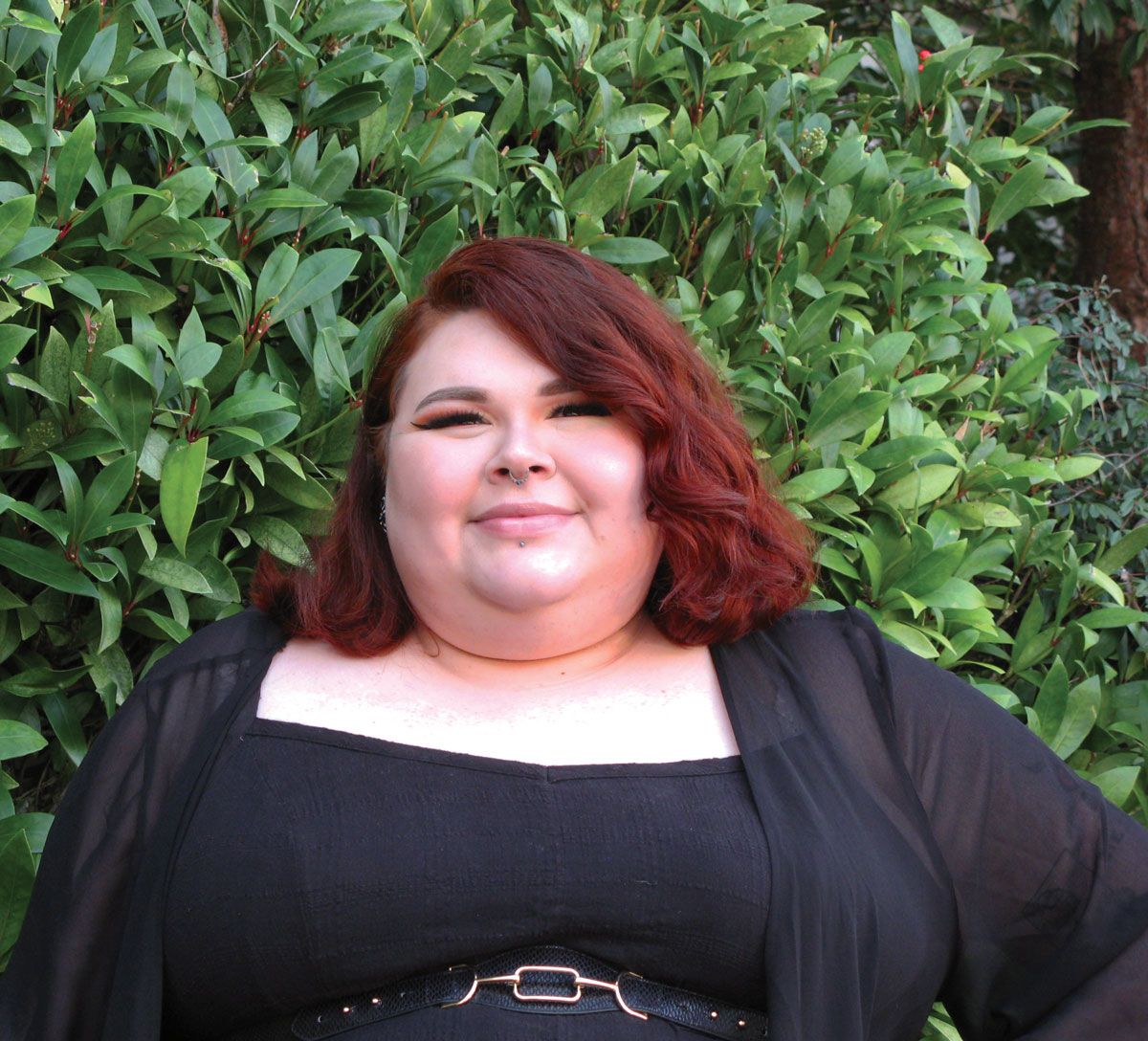Poetry, joy, and disruption with jaye simpson
jaye simpson is a Two-Spirit Oji-Cree person of the Buffalo Clan with roots in Sapotaweyak and Skownan Cree Nation who often writes about being queer in the child welfare system, as well as being queer and Indigenous. Writer Lisa Mayerhöfer sat down to talk jaye’s debut, the intimacies of intergenerational trauma, queerness, mess, dreams, and the softness of lowercase.
“I don’t like capitals. I don’t like it for my name, I don’t like it for anything really. Stylistically for me it comes across as a whisper. Lowercase has a melodic pacing that balances how loud and full of life I sometimes am.”
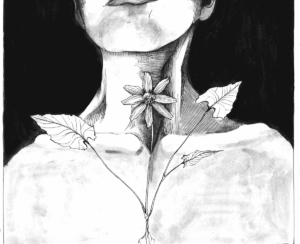
Thank you for being here, jaye! Your debut “it was never going to be okay” just came out with Nightwood Editions. How does that feel?
It feels surreal to have published a book, especially during a pandemic which adds another layer to it. I was expecting to be able to show it off more and have it be an opportunity for me to return to places where I come from. So, it’s bittersweet but also part of my biggest dream.
How did publishing the book come about? I think Massy Books played a big role in it?
The whole collection was years of work and a big part of it was myself, but it was also working in community. Being a co-host of “Indigenous Brilliance” with Massy Books and Room Magazine gave me more insight on how publishing works. For the longest time I was just a performer. The launch for my very first publication was at Massy Books, and the launch for this one was meant to be there too. Knowing that I have Patricia, along with the rest of the staff on my side, willing to front so many Indigenous authors across Turtle Island is so fantastic. The collection wouldn’t be where it is at without them, and my whole circle of kin that occupied Massy Books.
“Indigenous Brilliance” is a reading and performing series?
It is all of us gathering, being with each other and sharing stories. That inspiration is so integral to my writing process. I do most of my writing after hearing someone else speak.
Your writing process happens very much in relation to other people?
I like to practice with shape and form, so when I hear another poet who performs or writes in a different way from mine, I’m just so enthralled. Some of the people who inspire me so much are Brandy Bird, Emily Riddle, and Jessica Johns. My end result is always nothing like that person’s — but it is fueled by them. I would say inspiration is a big thing, but at the same time I also never want to take from someone without permission or acknowledgment.
How does the tradition of oral storytelling differ to writing? Is it just as integral?
Sometimes I will just speak — and some of it will be poetic, and then I’ll write that down. Some of it is very important to me in regards to oral storytelling as a people. But also, coming from my theatre background, improvised poetry can be some of the most beautiful work you will get. Even after my work is printed it’s not concrete for me. I’ll mix it up and people will be like, “That felt like a new poem” — well because it is. When we move into the world of oral storytelling and performance, there is such a uniqueness that cannot be found elsewhere. When someone knows how to read in their own voice it’s just so much more powerful.
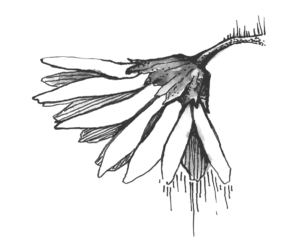
What was your first publication?
My very first publication was in a magazine called “Poetry is Dead”, in an issue entitled “Coven”. I love witchy things. Spiritualism is so important to me. I did not think that my submitted essay would be accepted because it was really cheeky.
What was it about?
It was about white witches taking space and criticizing BIPOC witchcraft and spiritualism. So I was calling out a lot of white supremacy within the community and it ended up being the very first piece in the whole collection. That was really incredible.
Did you like that kind of writing? Publishing an article?
Oh, I loved it. After that I just began to submit over and over again and was rapidly published. It was difficult because I had so many friends in the scene who would get so many rejections and then I’m there being like, “Oh yeah I just got published in six magazines in my first year.” I don’t think it was because I’m just so incredibly talented. I think I really benefitted from this new shift in publishing to get more voices that weren’t heteronormative and super white. I was finding my Indigenous kin and I were getting published more and more — and it was just nice to get that platform.
But also, my favourite is when I do get rejected. I really do enjoy rejection as a part of the publishing world because it is humiliating — which is very integral to my career. I don’t expect to be published because it’s my name — but for the craft. Part of me is like, “do I want to create an alternative identity and start publishing under that?” But it’s hard because my poetry is so pinpointed in my identity, so even if I were to try people would be like, how many queer, trans, Indigenous people are from this small, roughly 2200 membership in Manitoba, you know?
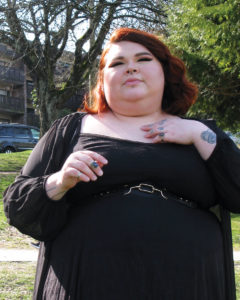
Is the editorial process important to you? To have someone read your work first and talk about it with you?
I love the editorial process. I love slicing things up, folding them in, I also love saying no. In university I had a professor who was like, “I just don’t like this poem, I think you should change it.” And I was like: “I’m gonna keep it as it is. I didn’t write this for publication, I wrote this for me.” She turned to the whole class and said, “See that is also important to remain true to your integrity, and this is art, and it is you.” I was being so mouthy, and it turned around to be like, actually sometimes you need to take that stance. Reflecting where I am now because this was like seven years ago, she was a hundred percent right. I hate that poem now. It’s so weak, but at the time it was necessary and important.
Is there a poem in here where you would also take that stance?
My manuscript got accepted by four or five publishers. I had to pick one which was a nerve-wracking process. One of the publishers didn’t want three of the poems, which were, and are, very important to me. They also happened to be poems that were in “Hustling Verse” which is a sexworkers’ anthology, so it was abundantly clear why.
That probably made the choice easier.
I was instantly like, then no. They are important to this collection and to my debut. I was kind of like “how dare you try to edit this out?”, because sometimes to be published you kind of have to adhere to their guidelines. Nightwood has a history of publishing sexworkers, Indigenous folks and queer folks — like Cassandra Blanchard’s great poetry collection, “Fresh Pack of Smokes”. I was like, this is where I wanna do that work. Nightwood made it very easy.
Does taking a stance about the content of a poem translate to when you perform it orally?
There are some poems that I don’t read out loud because I’m like that’s fine where it is. Coming from that theatre background, I pay attention to the audience and their body language. So I would take out a line or a stanza that I know might impact a little bit harder, or I’ll drop a poem really quickly. I like to leave my performances well rounded — where there is that emotional punch, but there is also joy, which is very very important to me. I just like to be fluid. I just like to play with words.
How do you feel about writing in English?
There are non-English words in here [it was never going to be okay], but I don’t italicize them anymore. I used to, not to show that they’re super different, but to communicate that this is not a word in English. Then, Nicole Lachat was like, “I invite you not to. Just disrupt English as a language and put yours in there.”
Is it Oji-Cree or Cree?
I’m Oji-Cree, but my specific dialect is Swampy Cree. It’s not as easy as just learning the language — only two communities speak that specific dialect.
I also noticed that no word ever gets capitalized.
Oh, I fucking hate capitals. I hate grammar. I hate honorifics. I hate ellipsis, even though there’s some authors who love ellipsis. I prefer the em dash and the ampersand. And that’s just my aesthetic. I don’t like capitals. I don’t like it for my name, I don’t like it for anything really. Stylistically for me it comes across as a whisper. Lowercase has a melodic pacing that balances how loud and full of life I sometimes am.
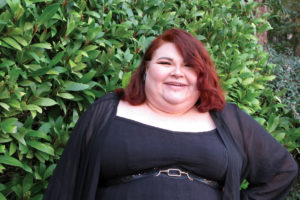
I am really enamoured with the title of your collection: “it was never going to be okay”
It is a line from the comic series, “The Wicked + The Divine”, and it resonated so deeply with me because my whole life had been narrated with these false affirmations like, “Oh, it’ll be okay.” It was never. People knew. All these people who told me it was going to be okay knew it wasn’t okay, and it wasn’t going to be okay. And at the time of my life when I read that comic book, it was such a visceral gut punch. I could not get it out of my head. It’s also my very clear statement of saying, just because it’s not okay doesn’t mean it’s all bad. Then it calls into question — what is okay?
The [Wicked + The Divine] is also super queer, diverse, and messy, and I love mess.
Why?
It gives me something to look at. And there’s nothing more satisfying than like a super clean apartment, but I am a reality TV show fanatic. Netflix’ “Bling Empire” was so good because it was so messy. Who knew I would be so invested in these rich people when I hate the rich? When I’m like, I will eat you all. I won’t because cannibalism is top-tier bad in my culture, but someone else will eat you, and I will watch.
I think my problems were so dark and so impactful that I enjoy watching these people have mess in their very mundane, privileged lives. I like to watch mess, I don’t like to be in it.
You often talk about how creating alternate realities helped you through the foster system and the colonial violence you experienced. Do you feel like you have more agency as an adult, or are the colonial structures so prevalent that all you can do is live and have your kin and good relationships surrounding you?
I don’t think it’s all I can do. I could really radicalize and burn down a building. I think I have that capacity. Am I going to do it right away? No, because the stakes are different for me. I would much rather have the people who systemically cannot be as injured as I can — who benefit from white supremacy — do the necessary work. Right now I will always focus on my reality: I am surrounded by people who love me and who I love. We’ve had years of communication and kinship, we also do a lot of community work to make sure that tomorrow can be kinder for others. So, I always want more, more for other people. My crafting of different realities as a coping mechanism was what made sure I could survive but now it doesn’t have to be an illusion it’s obtainable. And now I have to find new dreams because I’m accomplishing them and I think that’s a great thing.
I love the quote by your friend Billy-Ray Belcourt on the back of your book, he calls the last section of it, “a kind of love letter to trans Indigenous peoples, one is called on to build a new world. In this way, jaye simpson’s poetry is a vital artifact of a decolonial future.” What does a decolonial future look like to you?
That quote means so much to me because it’s from Billy-Ray. His work is so much about building decolonial futures and utopia. So many folks think decolonial means returning to 100% of what it was in the past — but I think it’s just about removing the systems. Specifically the policing of bodies, identities, and experiences.
My decolonial future is ever changing, according to the youth, because it’s not really my future anymore, you know? My future is unraveling now, and my hopes and dreams can only ever be mine. I think my biggest thing is the youth. Braided Warriors are doing some of the greatest work out here, and so much of it is being led by queer folk. It’s fantastic, the kids are alright. They’re making the right moves, they’re manifesting their utopia very quickly.
Another big focus for me is also on trans health. A lot of workplaces don’t have healthcare for trans folks, or their health insurance doesn’t cover hormones, or laser hair removal, or anything like that. How is that fair?
And also how does that enable a future?
Exactly. It doesn’t. All I’m gonna say is that it’s complicated, and I want utopia, I just don’t know how to formulate it. But I do believe in the dismantling of the current government system of a police force, and a focus on education — specifically in healthcare — to make sure everyone accesses equitable healthcare, especially Black and Indigenous people. It’s hard because when I think of my culture, and my people, we made sure everyone was housed, fed and got to exist in our community at their capacity and to their strength. That’s what I wish and hope for.
I just listened to a conversation with the poet Natalie Diaz and she talked about how she’s collecting words that she doesn’t trust like empathy or translation. She firmly believes that we have to be really critical with the practice of empathy and ask ourselves if it’s actually not harmful.
I’ve seen a lot of conversation on that too, empathy is just seen as such a red flag now and I agree. It’s a really new word too no? The term empath I think was coined in Star Trek but people took it on so much.
Or the sociologist Eva Illouz, who says it’s so dangerous and problematic if you need to be able to emphasize with someone in order to care about their struggles.
It’s this weird assertion that, instead of seeing the wound and addressing it, folks need to know how the wound got there. Also, sometimes, it’s not a wound — sometimes it’s just a need that needs to be met.
Preparing for this interview I was struggling with what to ask you about. Your book is so beautiful and there is so much heartbreak and cruelty in it, and I don’t want to make you repeat it if you don’t choose to do so yourself. At the same time, I also do not want to miss out on giving space to topics that are important to you.
In part, the collection was a way for me to refuse being gaslit long-term. And some folks really wanna talk about the trauma and the pain, and they wanna ask if my poetry fixed it, and that was not what it was meant to do. Yes, it was cathartic to talk about it, but did it heal me? No. It would take years of therapy, and that’s all I got to say about that. I want to be able to exist but I need folks to know the backstory.
There must be a lot of folks who read the collection and feel very much not alone anymore in what they have experienced?
My experience of foster care is by design, so you feel alone in every way possible because it’s hard to fight when you feel alone. As I began to enter the community and build more kinship networks. I realized that this was not a singular experience, but in fact a pattern, and the best way to break a pattern is to address it. I’m really glad that some people are realizing that their experiences aren’t singular. I also wish them the fire to burn it all down.
Currently jaye is working on new poetry, an anthology with one of their kin, as well as a kind of memoir about the past and their present pursuit of joy. They also dream about writing a children’s book.


